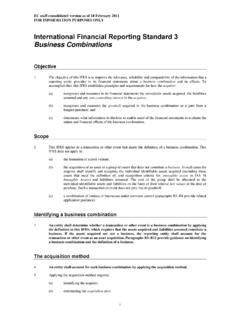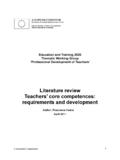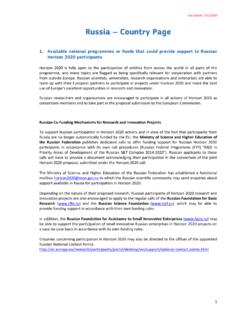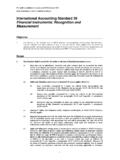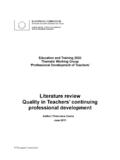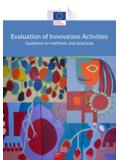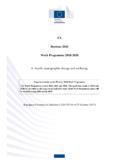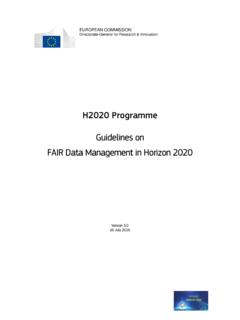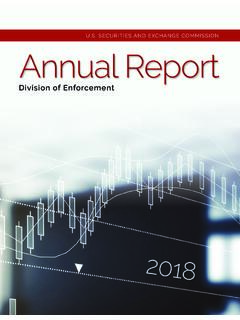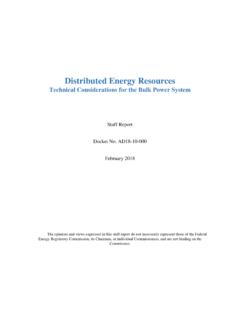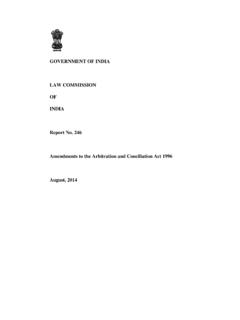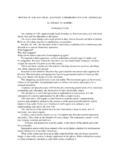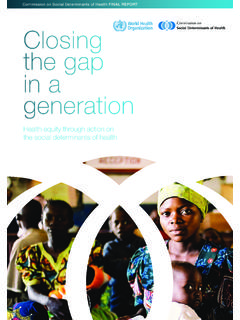Transcription of COUNCIL, THE EUROPEAN ECONOMIC AND SOCIAL …
1 EUROPEAN . commission . Brussels, COM(2019) 12 final report FROM THE commission TO THE EUROPEAN PARLIAMENT, THE. COUNCIL, THE EUROPEAN ECONOMIC AND SOCIAL COMMITTEE AND THE. COMMITTEE OF THE REGIONS. Investor Citizenship and Residence Schemes in the EUROPEAN Union {SWD(2019) 5 final}. EN EN. report FROM THE commission TO THE EUROPEAN PARLIAMENT, THE. COUNCIL, THE EUROPEAN ECONOMIC AND SOCIAL COMMITTEE AND THE. COMMITTEE OF THE REGIONS. 1. Introduction Recent years have seen a growing trend in investor citizenship ( golden passport ) and investor residence ( golden visa ) schemes, which aim to attract investment by granting investors citizenship or residence rights of the country concerned. Such schemes have raised concerns about certain inherent risks, in particular as regards security, money laundering, tax evasion and corruption. Three Member States operate investor citizenship schemes, where citizenship is granted under less stringent conditions than under ordinary naturalisation regimes, in particular without effective prior residence in the country concerned1.
2 Such schemes have implications for the EUROPEAN Union as a whole, as every person holding the nationality of a Member State is at the same time a citizen of the Union. Indeed, although these are national schemes, they are deliberately marketed and often explicitly advertised as a means of acquiring Union citizenship, together with all the rights and privileges associated with it, including in particular the right to free movement. Investor citizenship schemes differ from investor residence ( golden visa ) schemes, which aim to attract investment in exchange for residence rights in the country concerned, and exist in twenty EU Member States. However, the risks inherent to such schemes are similar to those raised by investor citizenship schemes. Furthermore, these schemes impact on other Member States as a valid residence permit grants certain rights to third-country nationals to travel freely in particular in the Schengen area.
3 The EUROPEAN Parliament, in its Resolution of 16 January 2014 2, expressed concern that national schemes involving the direct or indirect outright sale of Union citizenship undermined the very concept of Union citizenship. It called on the commission to assess the various national citizenship schemes in the light of EUROPEAN values and the letter and spirit of EU legislation and practice. The commission contacted the Bulgarian, Cypriot and Maltese authorities for further information on their schemes. In a debate in May 2018, the EUROPEAN Parliament discussed a range of risks associated with investor citizenship and residence schemes. In its 2017 Citizenship Report3, the commission announced a report on national schemes granting Union citizenship to investors describing the commission 's action in this area and examining current national law and practices, and providing some guidance for Member States.
4 To prepare this report , the commission commissioned a study on the legislation and practice pertaining to citizenship and residence schemes in all relevant Member States 4 and 1. See Section below for a definition of effective residence. 2. EUROPEAN Parliament Resolution of 16 January 2014 on EU citizenship for sale (2013/2995(RSP)). 3. report from the commission to the EUROPEAN Parliament, the Council, the EUROPEAN ECONOMIC and SOCIAL Committee and the Committee of the Regions on Strengthening Citizens' Rights in a Union of Democratic Change: EU Citizenship report 2017 (COM/2017/030 final). 4. Fact finding study. Milieu Law and Policy Consulting, Factual Analysis of Member States' Investor Schemes granting citizenship or residence to third-country nationals investing in the said Member State, Brussels 2018 ( the Study ). 1. organised a consultation with Member States. This report also takes into account other relevant sources, including recent publications on the topic5.
5 This report covers both investor citizenship and residence schemes and identifies the key areas of concern and risks associated with granting citizenship of the Union or residence rights on the basis of an investment only. In particular, the report sets out the possible security gaps resulting from granting citizenship without prior residence, as well as risks of money laundering, corruption and tax evasion associated with citizenship or residence by investment. It also describes challenges with respect to the governance and transparency of such schemes, looks at how these might be addressed and provides a framework for improvement. The report is accompanied by a Staff Working Document, which provides more detailed background information on investor citizenship and residence schemes. 2. Investor citizenship schemes in the EU. Context As expressed in the case law of the Court of Justice, nationality is a bond between a citizen and the State, and it is the special relationship of solidarity and good faith between [a Member State] and its nationals and also the reciprocity of rights and duties, which form the bedrock of the bond of nationality 6.
6 Citizenship of a country is traditionally based on birth- right acquisition, be it by descent (ius sanguinis) or by birth in the territory (ius soli)7. States also give immigrants the possibility to naturalise as citizens, provided they fulfil certain integration conditions and/or show a genuine connection to the country, which can include marriage to one of its citizens8. All Member States have such ordinary naturalisation procedures. Most Member States also have discretionary naturalisation procedures 9. Under such procedures, Member States can, on an individual basis, award citizenship to a foreigner on the basis of national interest . This can be for outstanding achievement, for example in the area of culture, science or sports. In some EU Member States, the legislation provides that 5. See in particular, EUROPEAN Parliamentary Research Service Citizenship and residency by investment schemes in the EU: State of play, issues and impacts , October 2018, (2018)627128.
7 Transparency International/Global Witness, EUROPEAN Getaway Inside the Murky World of Golden Visas, October 2018, 6. Judgment of 2 March 2010, Rottmann, C-135/08, EU:C:2010:104, paragraph 51. 7. For a full overview of types of acquisition of citizenship, including birth-right citizenship, see the Global Database on Modes of Acquisition of Citizenship, available at 8. Further detail concerning naturalisation via marriage in EU Member States is contained in Annex III of the Study, ibid, note 4. Member States generally take steps to prevent the abuse of such possibilities, for example in the context of marriages of convenience. To better detect and tackle fraudulently acquired nationality, national authorities are encouraged to use interviews or questionnaires, document and background checks, inspections or community-based checks while respecting applicable legal constraints, such as those related to burden of proof or fundamental rights.
8 They can also draw on the similarities between fraudulently acquired nationality and right of residence acquired via marriages of convenience with Union citizens (see the commission 's Handbook on marriages of convenience (COM/2014/604 final). 9. For further detail see Annex III of the Study, ibid, note 4. 2. national interest may be equated with ECONOMIC or commercial interest10. Discretionary naturalisation procedures can be used in individual cases to grant citizenship in exchange for investment. Such discretionary naturalisation procedures are highly individualised and used on a limited basis. They are therefore not the object of this report . Bulgaria, Cyprus and Malta introduced in 2005, 2007 and 2013 respectively11 broader schemes aimed at attracting investment from third-country nationals by facilitating access to their citizenship. These schemes are a new form of naturalisation as they systematically grant citizenship of the Member State concerned, provided the required investment is made and certain criteria fulfilled12.)
9 Since Bulgaria13, Cyprus and Malta are the only Member States which operate investor citizenship schemes, this section of the report focusses on the legislation and practice of these countries. Type and amount of investment required Investor citizenship schemes aim to attract investment by offering citizenship in return for a defined amount of money. In Bulgaria, an overall investment of EUR 1 million is requested under its fast-track14 investor citizenship scheme. In Cyprus, a minimum investment of EUR 2 million is necessary, together with ownership of property in Cyprus. In Malta, a contribution of EUR 650,000 must be paid into a national investment fund, together with an investment of EUR 150,000 and a requirement to own or rent property in Malta15. In Cyprus and Malta, additional investments for family members are required. Various investment options can be observed among the three Member States operating investor citizenship schemes: capital investment16; investment in immovable property17.
10 Investment in government bonds18; and one-off contributions to the State budget19. In addition to the investment requirement, applicants must also pay non-refundable administrative fees as 10. Countries where the legislation explicitly equates national interest with the ECONOMIC or commercial interest of the state are Austria, Bulgaria, Slovenia and Slovakia. For details, see Study Overview, ibid, note 4. 11. For details of these schemes see the Study, ibid, note 4. 12. See J. Dzankic, The pros and cons of ius pecuniae: investor citizenship in comparative perspective, Robert Schuman Centre for Advanced Studies, EUDO Observatory, Issue 14. 13. In Bulgaria, on 15 February 2018 a working group was set up by the Minister of Justice to draft amendments to the Bulgarian Citizenship Act, including to the investor citizenship scheme which Bulgaria is considering abolishing in the future.
